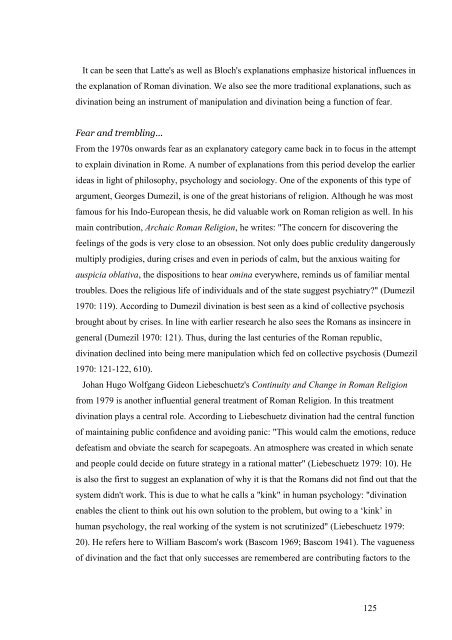The dissemination of divination in roman republican times
The dissemination of divination in roman republican times
The dissemination of divination in roman republican times
You also want an ePaper? Increase the reach of your titles
YUMPU automatically turns print PDFs into web optimized ePapers that Google loves.
It can be seen that Latte's as well as Bloch's explanations emphasize historical <strong>in</strong>fluences <strong>in</strong><br />
the explanation <strong>of</strong> Roman <strong>div<strong>in</strong>ation</strong>. We also see the more traditional explanations, such as<br />
<strong>div<strong>in</strong>ation</strong> be<strong>in</strong>g an <strong>in</strong>strument <strong>of</strong> manipulation and <strong>div<strong>in</strong>ation</strong> be<strong>in</strong>g a function <strong>of</strong> fear.<br />
Fear and trembl<strong>in</strong>g...<br />
From the 1970s onwards fear as an explanatory category came back <strong>in</strong> to focus <strong>in</strong> the attempt<br />
to expla<strong>in</strong> <strong>div<strong>in</strong>ation</strong> <strong>in</strong> Rome. A number <strong>of</strong> explanations from this period develop the earlier<br />
ideas <strong>in</strong> light <strong>of</strong> philosophy, psychology and sociology. One <strong>of</strong> the exponents <strong>of</strong> this type <strong>of</strong><br />
argument, Georges Dumezil, is one <strong>of</strong> the great historians <strong>of</strong> religion. Although he was most<br />
famous for his Indo-European thesis, he did valuable work on Roman religion as well. In his<br />
ma<strong>in</strong> contribution, Archaic Roman Religion, he writes: "<strong>The</strong> concern for discover<strong>in</strong>g the<br />
feel<strong>in</strong>gs <strong>of</strong> the gods is very close to an obsession. Not only does public credulity dangerously<br />
multiply prodigies, dur<strong>in</strong>g crises and even <strong>in</strong> periods <strong>of</strong> calm, but the anxious wait<strong>in</strong>g for<br />
auspicia oblativa, the dispositions to hear om<strong>in</strong>a everywhere, rem<strong>in</strong>ds us <strong>of</strong> familiar mental<br />
troubles. Does the religious life <strong>of</strong> <strong>in</strong>dividuals and <strong>of</strong> the state suggest psychiatry?" (Dumezil<br />
1970: 119). Accord<strong>in</strong>g to Dumezil <strong>div<strong>in</strong>ation</strong> is best seen as a k<strong>in</strong>d <strong>of</strong> collective psychosis<br />
brought about by crises. In l<strong>in</strong>e with earlier research he also sees the Romans as <strong>in</strong>s<strong>in</strong>cere <strong>in</strong><br />
general (Dumezil 1970: 121). Thus, dur<strong>in</strong>g the last centuries <strong>of</strong> the Roman republic,<br />
<strong>div<strong>in</strong>ation</strong> decl<strong>in</strong>ed <strong>in</strong>to be<strong>in</strong>g mere manipulation which fed on collective psychosis (Dumezil<br />
1970: 121-122, 610).<br />
Johan Hugo Wolfgang Gideon Liebeschuetz's Cont<strong>in</strong>uity and Change <strong>in</strong> Roman Religion<br />
from 1979 is another <strong>in</strong>fluential general treatment <strong>of</strong> Roman Religion. In this treatment<br />
<strong>div<strong>in</strong>ation</strong> plays a central role. Accord<strong>in</strong>g to Liebeschuetz <strong>div<strong>in</strong>ation</strong> had the central function<br />
<strong>of</strong> ma<strong>in</strong>ta<strong>in</strong><strong>in</strong>g public confidence and avoid<strong>in</strong>g panic: "This would calm the emotions, reduce<br />
defeatism and obviate the search for scapegoats. An atmosphere was created <strong>in</strong> which senate<br />
and people could decide on future strategy <strong>in</strong> a rational matter" (Liebeschuetz 1979: 10). He<br />
is also the first to suggest an explanation <strong>of</strong> why it is that the Romans did not f<strong>in</strong>d out that the<br />
system didn't work. This is due to what he calls a "k<strong>in</strong>k" <strong>in</strong> human psychology: "<strong>div<strong>in</strong>ation</strong><br />
enables the client to th<strong>in</strong>k out his own solution to the problem, but ow<strong>in</strong>g to a ‘k<strong>in</strong>k’ <strong>in</strong><br />
human psychology, the real work<strong>in</strong>g <strong>of</strong> the system is not scrut<strong>in</strong>ized" (Liebeschuetz 1979:<br />
20). He refers here to William Bascom's work (Bascom 1969; Bascom 1941). <strong>The</strong> vagueness<br />
<strong>of</strong> <strong>div<strong>in</strong>ation</strong> and the fact that only successes are remembered are contribut<strong>in</strong>g factors to the<br />
125


